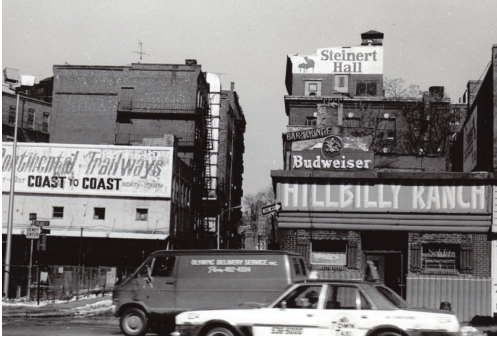
Courtesy of Boston Landmarks CommissionBoston may be the hub of the universe, but it’s a thousand miles north of Nashville’s Grand Old Opry.
In the 1960s and 1970s, however, Park Square’s Hillbilly Ranch brought live country and western music to the city and helped Boston make its modest mark on the country music landscape.
From 1960 to 1980, the Hillbilly Ranch was the only venue in Boston devoted to country music.
Something of a landmark with its stockade fence façade, the bar’s patrons could hear live country, western and bluegrass five nights a week. The bulk of the entertainers were locally based acts transplanted from across the south, but the bar also hosted performances by legends like Johnny Cash and Loretta Lynn.
The Hillbilly Ranch found success from the moment it opened its doors, tapping into two trends rapidly changing the face of the city. In the 1940s and 1950s, Americans from rural areas poured into cities where jobs were more plentiful. Boston was no exception, particularly in the wake of World War II and the Korean War, which established Boston as a major military port and industrial center. These transplants had nowhere in Boston to hear the music they grew up on.
“In
Boston, there were the shipyards in Charlestown and Quincy and
factories all over town,” said photographer Henry Horenstein, a
documentarian of country music history. “People came here for work, but
at night they wanted a place to go out and hear their music.”
Soon
after the Hillbilly Ranch opened its doors, Boston began demolishing
Scollay Square, pushing the red-light district into the Combat Zone.
Located where the State Transportation Building now stands, the
Hillbilly Ranch found an immediate clientele in the soldiers and sailors
who frequented the area.
The
bar was enough of a fixture on country’s national touring circuit that
it was immortalized in a John Lincoln Wright song following its closure
in 1980:
They tore down the Hillbilly Ranch The wrecking ball blew it away
They put up a government building The Hillbilly’s gone away.
Yet
the Hillbilly’s influence on American music has not gone away. While
New England has never been a fertile breeding ground for country
musicians, the bar provided a home for the city’s small country scene
throughout the 60s and 70s. These artists profoundly influenced Boston’s
exploding folk revival scene in the 60s, and many of those musicians
began mixing bluegrass and other rural American styles into their sound.
Two
friends from Massachusetts founded Rounder Records in 1970 to give
those artists a platform, launching the style that would eventually be
known as “roots” or “Americana,” along with the careers of artists from
George Thorogood and Bela Fleck to Alison Krauss.
“They
discovered these folk singers that connected country and old time
mountain music and bluegrass music,” said Horenstein. “They saved that
music for posterity.”